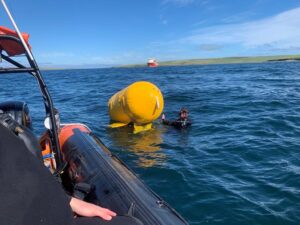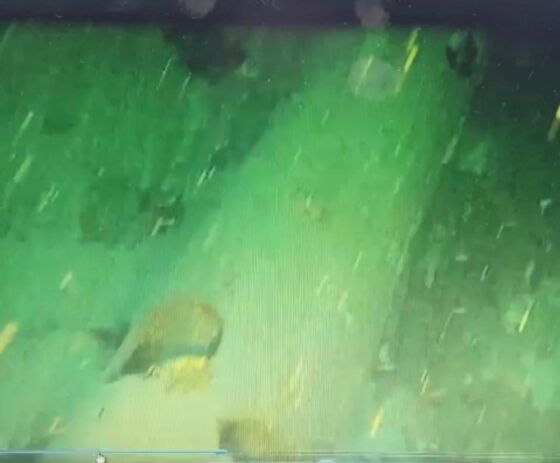
Des experts de la Royal Navy font exploser une vieille torpille pendant une opération de quatre jours

Des experts en neutralisation des bombes de la Royal Navy ont fait exploser en toute sécurité une vieille torpille à Scapa Flow dans les îles Orcades. Une équipe de spécialistes du groupe de plongée et d'exploitation des menaces de la Royal Navy s'est rendue aux Orcades après que le navire d'enquête MV Athena a trouvé l'appareil vieillissant en scannant un itinéraire pour les câbles sous-marins entre Flotta et South Ronaldsay.
Les garde-côtes ont été alertés du dispositif et une zone d'exclusion de 100 mètres a été mise en place autour du lieu.
"C'était une tâche difficile", explique Roy Edwards, plongeur. "L'engin suspecté était situé à 210 mètres d'un oléoduc et la météo était également un problème avec un état de la mer 2-3 et des rafales de vent à 20 nœuds.
"La torpille était très dégradée et nous devions la déplacer vers un endroit sûr, loin du pipeline, avant de pouvoir l'éliminer en toute sécurité. C'était un travail délicat. »
L'opération s'est décomposée en plusieurs phases. Après avoir plongé, localisé et marqué la torpille, l'équipe a attaché des sangles et utilisé un équipement de levage sous-marin pour la remonter soigneusement à la surface. Il a ensuite été remorqué sur quatre kilomètres jusqu'à un nouvel emplacement bien éloigné des câbles sous-marins, des pipelines et des fermes piscicoles.
Enfin, les plongeurs ont effectué une explosion sous-marine contrôlée pour éliminer les munitions.
Malheureusement, l'état de la torpille était médiocre et n'a pas pu être identifié avec certitude, même si on pensait qu'il s'agissait d'une torpille Mark 8, un type qui est entré en production dans les années 1920.
La tâche à Scapa Flow est la troisième à laquelle l'escadron Charlie a participé aux Orcades cette année.
Au total, l'équipe s'est attaquée à 63 tâches d'élimination de munitions conventionnelles et à trois tâches d'engins explosifs improvisés dans toute leur zone d'opération, qui va de Liverpool à Hull puis vers le nord pour englober l'Écosse, y compris toutes les îles périphériques.
Au début de cette année, la Marine a été appelée pour aider une entreprise spécialisée à couper les mâts d'un cargo coulé dans la Tamise, après qu'une enquête a révélé que la dégradation pourrait déclencher une explosion mortelle de 1 400 tonnes d'explosifs à bord.

